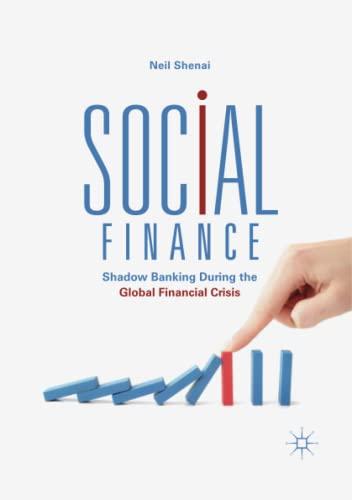Question
Answer the exercise 19.4 Search costs Sometimes, information isnt fully asymmetric, but is costly for buyers to acquire Buyers can get this information through searching
Answer the exercise
19.4 Search costs
Sometimes, information isnt fully asymmetric, but is costly for buyers to acquire
Buyers can get this information through searching
Searching is costly
Time
Resources (e.g., travel costs from one seller to the next)
In these instances, buyers have an optimal amount of search they will be willing to undertake, given
The opportunity cost of their time
How much time and other resources it costs to check additional stores
The expected gain from searching (how much better of a deal they think they can find elsewhere)
The magnitude of the purchase (youre willing to spend more time searching for the best deal on a car than on a pumpkin).
Expectations play a large role here. If you knew for sure where the price was lowest, you would go directly there. You have uncertainty about whether a certain store will be cheaper or more expensive than another
The amount of searching youre willing to do depends on your prediction about the spread of prices across a variety of stores. You have some idea about whether the same item is likely to be cheaper elsewhere.
If you expect that the prices at all stores will be very close, you are less likely to expect to benefit from searching.
If you expect that the prices at all stores are widely variant, and the first store you go to has a price at the higher end of that range, you are more likely to expect to benefit from searching for cheaper prices elsewhere.
Example: Search for lowest food prices
Say I have some general idea that the price of a can of green beans will run from 40 cents to $1.20, and the prices are normally distributed
My prior expectation is that a given store will have green beans available for the average price of 80 cents.
If I go to Piggly Wiggly and the price is $1, Im quite likely to find a lower price if I visit just one more store.
If I go to Festival and the price is 60 cents, Im pretty unlikely to find a lower price if I visit just one more store -- Id be more likely to see a higher price at the next store.
Its costly to go to multiple stores, so most people just buy their whole grocery list all at one place. Some people, however, do go to multiple stores each time they shop for groceries and keep track of prices.
Stores make this easier for selected items by sending flyers with (presumably) their best deals.
Recall our discussion of price discrimination through coupons.
Addressing search costs
As mentioned, stores (grocery stores, car dealerships, etc.) have the incentive to publicize their best deals through flyers and ads
The internet has greatly reduced search costs -- it takes very little time to check Amazon, Zappos, Nordstrom, etc., to find the cheapest place to buy a particular pair of shoes.
Exercise: Searching for lowest gas prices
Are you that person who drives around looking for cheaper gas? The big question: Is it worth it -- are you likely to save money on net?
This will depend on the costs and expected benefit of searching.
Suppose you are trying to decide whether to drive 2 miles round-trip out of your way to see if gas is cheaper at another gas station.
Use current gas prices and facts about your car (or your best guess) to calculate how much the gas you would use to go those extra two miles -- what is the cost of that extra gas?
To make the search trip worth it, how much cheaper must you expect the other gas station will be? (Remember youll probably buy more than one gallon of gas, so use your own usual fill-up quantity for this calculation.)
What other costs does this calculation ignore? How would those affect your willingness to search?
Are you more or less likely to take the detour if you think the station nearby you has prices higher than the average in your area?
Step by Step Solution
There are 3 Steps involved in it
Step: 1

Get Instant Access to Expert-Tailored Solutions
See step-by-step solutions with expert insights and AI powered tools for academic success
Step: 2

Step: 3

Ace Your Homework with AI
Get the answers you need in no time with our AI-driven, step-by-step assistance
Get Started


